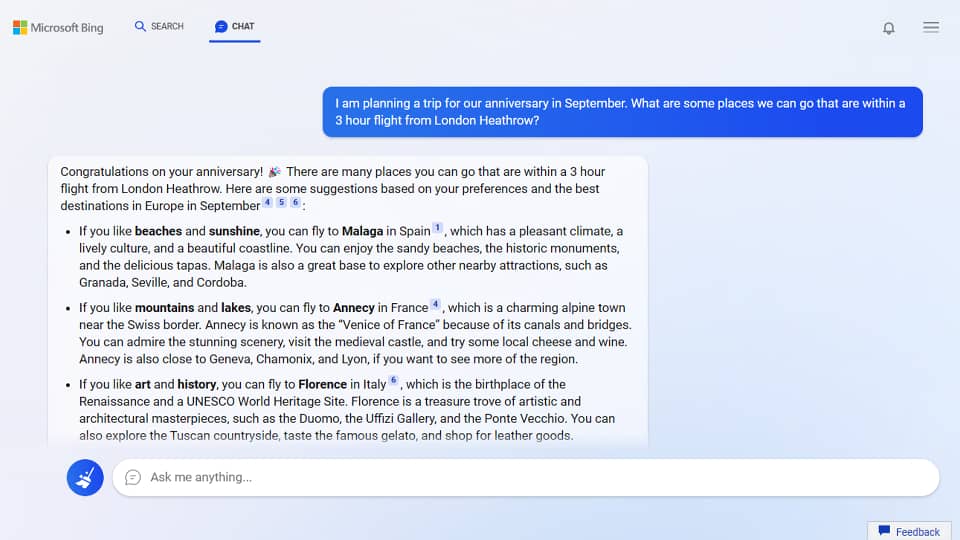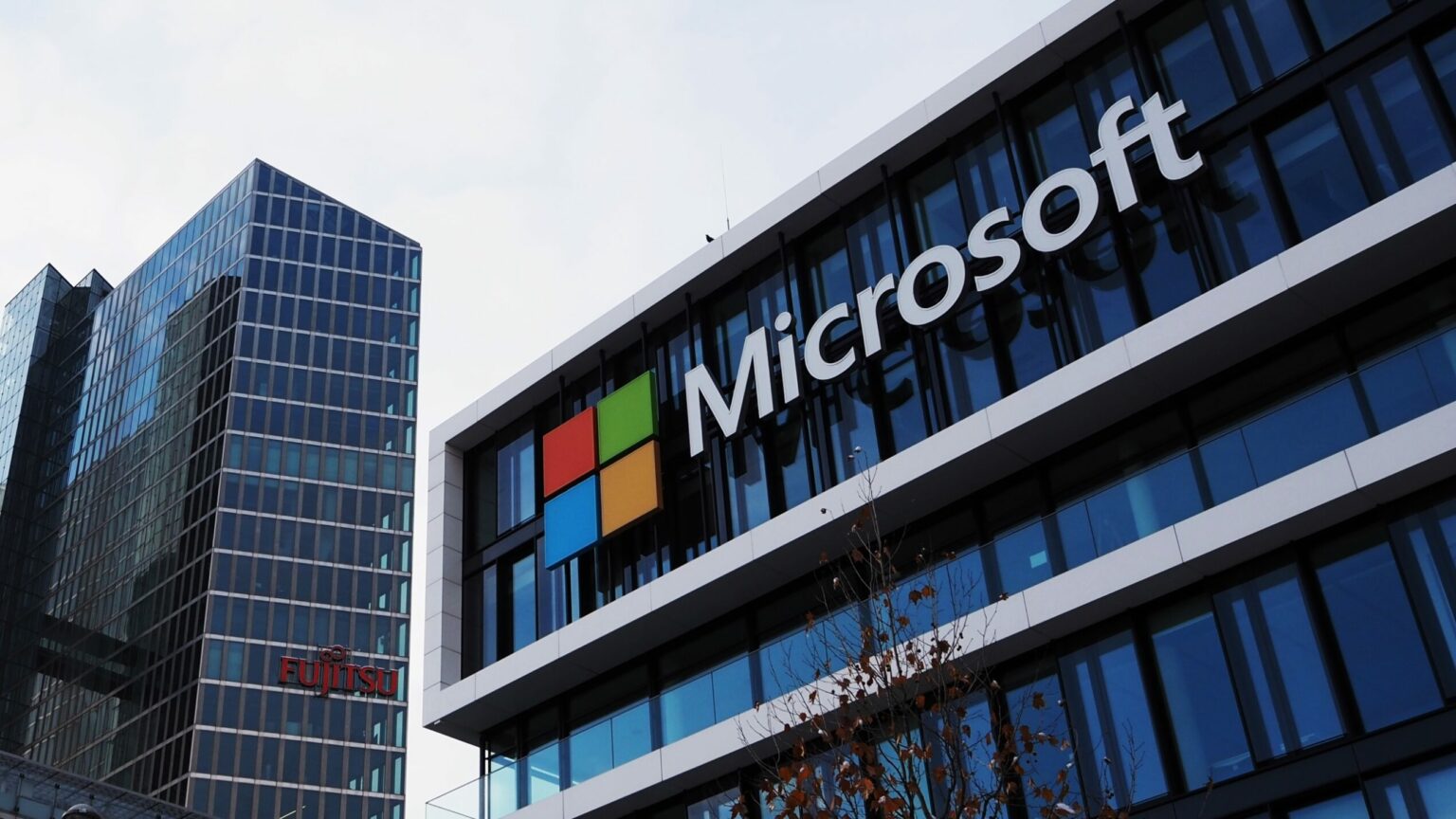Microsoft announced on Tuesday the launch of its remodeled Bing search engine and Edge web browser. Both are powered by the artificial intelligence (AI) technology behind ChatGPT, as the U.S. tech company takes on Google’s market dominance.
Chairman and CEO Satya Nadella said that Bing will provide more than just a list of search results. It will also respond to questions with more detail, chat with users and generate content as requested by users in their queries. He called these tools an “AI copilot for the web.”
Also read: Unlike Bitcoin, ChatGPT Creator Mira Murati Wants AI Regulated
“AI will fundamentally change every software category, starting with the largest category of all – search,” said Nadella, in a blog post. “Today, we’re launching Bing and Edge powered by AI copilot and chat, to help people get more from search and the web.”
Nadella revealed that Bing will run on a more “powerful” large language model from OpenAI than the one which supports ChatGPT. It is customized specifically for search, he said, and combines improvements from ChatGPT and GPT-3.5 to be “faster and more accurate.”
Today we previewed the new Bing and Edge powered by AI. @SatyaNadella shares why and how we’re innovating in AI, starting with the largest software category – search. pic.twitter.com/sN4zbHHa6X
— Microsoft (@Microsoft) February 7, 2023
Microsoft CEO: AI ‘race starts today’
The Microsoft update comes as ChatGPT, the popular OpenAI conversational tool, sparked off an AI arms race since it was launched in late November. The chatbot uses AI to generate human-like responses on almost every topic, including wrting essays, poetry and code.
On Monday, a day before the Microsoft reveal, Google unveiled its new AI chatbot tool called “Bard”, as a direct response to the success of ChatGPT.
Google opened up Bard to “trusted testers” starting Feb. 6, according to CEO Sundar Pichai. The company is planning to make the tool available to the public in the coming weeks.
“Bard seeks to combine the breadth of the world’s knowledge with the power, intelligence and creativity of our large language models … It draws on information from the web to provide fresh, high-quality responses,” Pichai wrote in a blog post.
Satya Nadella, the Microsoft CEO, described the company’s revamped Bing search engine as “a new paradigm for search,” and added that “rapid innovation is going to come.”
“In fact, a race starts today … everyday we want to bring out new things, and most importantly, we want to have a lot of fun innovating in search because it’s high time.”
There is around 10 billion search queries a day, but half of them go unanswered, according to some estimates.
How the new Bing works
Microsoft, which invested billions of dollars in OpenAI, said the new Bing will be available for sample queries starting Feb. 7, with a small group of users having unlimited access. It said full access for both desktop and mobile will roll out to millions of users in the coming weeks.
Users utilizing the new Bing can create a 5-day trip itinerary for a family in a certain city, with links to book travel and accommodations or prep for a job interview. It can then generate an email with that itinerary for the user to send around to their family.
If necessary, the tool could even translate the email into other languages. Users could also search for TVs to buy in a new interactive chat. Once the results come up, the user can ask Bing via chat for additional information, such as which TVs cost less.

The improved Bing reviews results from across the web to find and summarize answers that users are looking for. It can get detailed instructions for how to substitute eggs for another ingredient in a cake you are baking right in that moment, said Microsoft.
“With answers, we go far beyond what Search can do today,” said Yusuf Mehdi, Microsoft’s vice president and consumer chief marketing officer.
The new Microsoft Edge browser will have the Bing AI capabilities built in with two additional functionalities, chat and compose. It allows users to chat with the search tool on the side of a web page, to ask questions about the page or compare it with content from elsewhere.
“You can also ask Edge to help you compose content, such as a LinkedIn post, by giving it a few prompts to get you started,” added Mehdi.
Microsoft challenges Google’s dominance
Google has for long dominated the online search business but there’s some belief that emerging AI tools such as ChatGPT, and now Microsoft’s AI-powered Bing, could pose a threat to that dominance.
Analysts say “it is hard to say whether it [Bing] will dramatically reshuffle the competitive landscape in search” given that Bing is a distant second to Google. It controls just about 3% of the global search market, compared to Google’s more than 90%.
Regardless, Google isn’t waiting for Microsoft to catch up with it. The company has already announced its own AI chatbot Bard, to rival both ChatGPT and Microsoft’s Bing.
Microsoft chief financial officer Amy Wood, told an investor call on Tuesday that “every percentage point of share it gains in search equals roughly $2 billion in additional advertising revenue,” reported The Information.
In the December 2022 quarter, Microsoft’s revenue from search and news advertising was $3.2 billion. That’s just 6% of its total revenue of $52.7 billion for the period, said the tech publication.
For the same quarter, Google’s parent company Alphabet received 56% of its profit margins from search business.
Microsoft dealing with AI biases
In partnership with OpenAI, Microsoft said it has been “implementing safeguards to defend against harmful content.” AI tools like ChatGPT have raised some concerns, “including about their potential to perpetuate biases and spread misinformation.”
“We know we wont be able to answer every question every single time,” Mehdi said. “We also know we’ll make our share of mistakes, so we’ve added a quick feedback button at the top of every search, so you can give us feedback and we can learn.”









 and then
and then